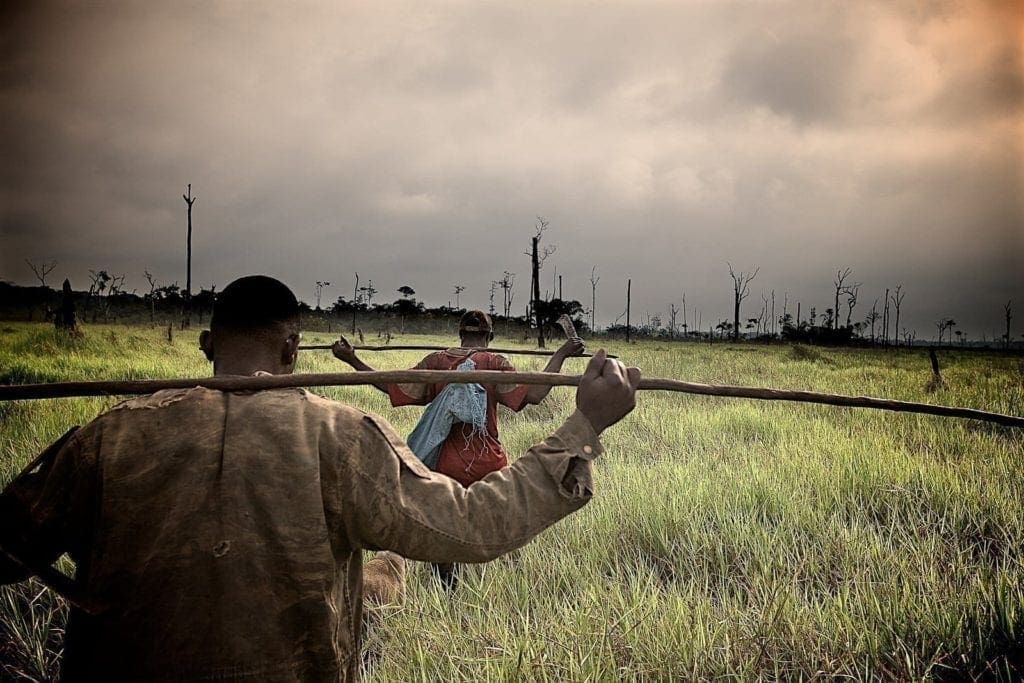It happened in the early months of 2010.
I met Africa, the real one, the dirty, colorful, heady and smelly one.
And the first time it happened in Cameroon. I landed late at night and without luggage at the airport in the capital Yaoundé. After a long wait at the delivery belts next to other sweaty and puzzled travellers, we were told from a small camping table marked Lost&Found that our luggage had been left (lost?) in Douala during the technical stopover a few hours earlier. Or at least that’s what the big lady standing there in front of us implied, unconvinced and sleepily.
An improbable tunic-I think it was meant to be a uniform-with a skinny guy in it approached. Certainly, the size was wrong but he seemed not to notice and wore it proudly. It made us realize that the luggage-maybe-could also be searched. And it made us realize that the luggage-maybe-could also be found. A handful of small U.S. dollars magically started the delivery belt with squeaky, lazy noise. My bag appeared. I had arrived in Africa.
And I wrote down for the first time in the experience notebook what had happened.
I spent the first night in a small hotel in the nearby suburb of the city, and, as in the most classic film noir, my window also had a colourful neon sign that mixed its hum with that of mosquitoes. The room could be considered gnomic, and for a good part of the sleepless night, I tried to figure out how they had managed to fit that huge solid wood bed inside that small room. I decided that they had built it inside: there was no other solution.
Although the hotel also housed a brothel downstairs, the night was quiet: the sounds of girls on the stairs blended with the buzzing of mosquitoes and colourful neon. And to the heat, which was already beginning to make itself felt.
In the morning, there arose what I considered the greatest tragedy for those who, like me, shy away from coffee as the sole architect of that inexplicable alchemy that transforms deep sleep into a semblance of human presence. But the coffee was not there!
And I wrote again in my Notebook of Experiences.
We set off in the car with the sun shyly marking the city’s horizon, a pineapple in hand and the denied hope of the coveted coffee.
Destination Akonolinga: an urban agglomeration of a few thousand inhabitants a hundred kilometers from the capital. Getting out of the city proved to be a challenge: haphazardly constructed traffic circles, traffic and mega billboards of national soccer heroes. But nothing compared to the countless checkpoints, governmental some, “private” others, but all called to fatten the pockets of the military or any tribal leader who had decided to be a vigilante that day.

We arrived at our destination in the afternoon having traveled a little over 100km.
I learned very quickly that in Africa distance is always calculated in Time and never in Kilometers.
They taught me that the unexpected can be considered planned.
That the passing of Time corresponds to the beginning of an Event and in between there is nothing.
That there is never a right time to leave.
And even less certainty of arrival.
My time here was spent with Valentine and his large family, inventing a new way to communicate with each other every day. My French: too scholastic to sustain a speech and he didn’t speak it anyway. My head: too hard to learn the local dialect, a derivation of patois.
I wrote another note in the experience notebook: ���…The voice sometimes produces only noise. While the eyes – through glances – know how to converse with the soul. ”.
I spent my time in the village of Mfan at the edge of the forest about 20km from Akonolinga.
The village came into existence in the middle of the last century when the French built a long red earth road cutting through the forest at the edge of the savannah. Along the way, the French wanted to lay long telephone poles. The people who lived inside the forest dragged themselves here to make some money. Entire villages were moved along this road. At some point, the French left. The road remained. Mud houses as well. The telephone poles were never installed.
I spent my days in Mfan village at the edge of the forest with Valentine and his large family. And after the first moment of mockery and laughter at me-because I was white-Valentine and other village men took me with them to hunt in the bush.
Certainly not for the sake of it but for the need to eat. A hunt made up of running and chasing, yelling, calling, whistling, fire and smoke. A hunt for small prey: rats and rodents, and on lucky days, sometimes even some antelope, but only when the good African God of reference had the heart to make her appear.
I spent my time with them and with them I breathed, I ate, I “got dirty”… and then I breathed again.
Like everything else in Africa, Time also always begins and ends with one event only, and my time with them had a name.
The name that Valentine, with a hug and the emotion in his deep black eyes gave me when we parted: Moet-be-Kier, the iron man.
And this story is that time.

